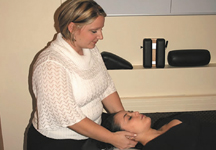Stress And Chiropractic

The modern world is becoming increasingly complex, and the demands on our time and attention are many. Our jobs are also more complex, and the business world has become more competitive. With the industrial age came helpful machines and increased productivity, but it also brought us the jackhammer, the loudspeaker, the motorcycle and car, and innumerable noisy machines. Physical stresses such as sound, air and water pollution have worsened over the last century, especially in the United States. We are also, because of electronic media and the Internet, aware of troubles and tragedies around the world that previous generations would never have known about, creating anxiety. Taken together, these assaults on our senses create a physical and emotional reaction.
The word for this overwhelming feeling is stress. It’s term borrowed from the field of engineering, in reference to physical forces upon mechanical structures. The term was first used in its modern medical sense around the turn of the 20th century by Walter Cannon, a Harvard physiologist. Cannon also first described the “fight or flight” syndrome, and noted the damaging physical effects of a continuous stress response. Modern healthcare is increasingly recognizing that many illnesses are caused by stress, or worsened by stress. In fact, in every chiropractic office, many patients will show the ravages of chronic stress. While chiropractic can treat the effects of stress on the body, such as headaches, it can also help the body manage and process stress in a healthy way.
How We React to Stress
We perceive stress from three basic sources: our environment, our body and our emotions. Environmental stress includes noise, weather, physical threats, time pressures, and performance standards. Body stress includes disease processes, organ malfunction, poor nutrition, poor sleep, and physical injury.
Emotional stress is more difficult to define. It encompasses our reactions, in thought and emotion, to environmental and physical stressors. Criticism, for example, is devastating to some, while others seem unaffected. In many ways, however, we are each in control of how much emotional stress we will feel.
Relaxation techniques, meditation and contemplation, hypnosis, and similar approaches can all have a strong mediating affect on stress. These techniques provide tools that allow one to gain greater control over reactions to stress, and therefore reduce the overall effects of a stressful event.
Effects of Stress on Health
Stress, whether physical or perceived, triggers a fight or flight response. This is a systemic physical reaction, affecting almost every part of the body. The hypothalamus, a part of the brain, stimulates the sympathetic nervous system (SNS). The heart rate increases, blood volume and blood pressure increase, blood is directed away from digestion and the extremities. Vision becomes more focused, hearing more acute. In response to the messages from the SNS, the adrenal glands secrete corticoids, including adrenaline, epinephrine, and norepinephrine. All of this is very useful if we’re running from a prehistoric raptor, or confronting a more modern threat to physical safety. When prolonged, however, the long-term effects of this state can be disastrous to good health.
Many studies of people who have been subjected to chronic stress have found evidence of the negative health effects of stress. These effects include high blood pressure, damage to muscle tissue, diabetes, infertility, damage to the immune response, and slowed healing from disease and injury. Stress reactions are also at the root of disorders such as post-traumatic stress disorder, and stress has been linked in human and animal research with cardiovascular disease.
Chiropractic Treatment and Stress
Chiropractors work primarily with the spine, the root of the nervous system through which nerve impulses travel from the brain to the rest of the body. One effect of chronic stress is prolonged muscle tension and contraction. This muscle tension creates uneven pressures on the bony structures of the body, often leading the misalignment of the spinal column.
Chronic stress also leads to nerve irritation. The adjustments of a chiropractor release muscle tension, and that helps the body return to a more balanced, relaxed state. Adjustments also reduce spinal nerve irritation, and improve blood circulation. These changes may be enough, in many cases, to convince the brain to turn off the fight or flight response, beginning the process of healing. A healthy and balanced spine is one key to effectively managing stress.
Chiropractors are trained in nutritional and other therapies for stress. Several nutritional supplements, including B vitamins, help the body cope with stress. A Doctor of Chiropractic may also recommend relaxation techniques, and discuss posture and environmental changes to help recovery from chronic stress.
A chiropractor cannot make a job less stressful, or create a quieter, calmer world. What chiropractic treatment can do is help you develop healthy responses to stress, reducing potential physical damage.
Ways to reduce stress
Wake up your spine – do some simple spinal stretches daily to enhance posture, breathing, and health.
Eat the breakfast of champions – breakfast should consist of anti-oxidants (fruits and vegetables), fast-absorbing protein (non-denatured whey or eggs), and high-quality fat (coconut).
Your body should consist of 70% water, but you may measure around 50%, especially in the middle of the afternoon. Optimal hydration, with pure, clean water and functional beverages is often the limiting factor in maintaining your optimal energy and stress levels.
OUR SERVICES INCLUDE:

• Family Care
• Neck and Back Pain
• Sciatica
• Sports Injuries
• Migraine and Tension Headaches
• Muscle Sprains and Strains
• Numbness/Stiffness
• Personal Injury
• Motor Vehicle Accidents
• Whiplash
“I am so happy I discovered Dr. Katie and chiropractic care! I started getting regular adjustments for headaches and burning back pain related to stress from work. I quickly learned the numerous benefits of chiropractic care to maintain overall health and wellness. I continued to receive regular adjustments throughout two pregnancies and attribute smooth deliveries and decreased back pain to the care I receive from Synergy. Currently my toddler and infant recieve regular adjustments as well. Chiropractic care has helped them with reflux, constipation and ear issues naturally. As a parent, I feel reassured that I am exposing my children to a natural medicine vs. the standard drugs.” ~ Jennifer Trieval, school teacher
“Chiropractic care continues to improve my life! I have significantly more range of motion in my neck and much, much less pain! There are stretches of time when I am pain free, and my dancing is better and easier too! Thank You Synergy Chiropractic!”~ Bonnie Reese, Nurse and Belly Dancer
Dr. Katie Schuler
Doctor of Chiropractic
Synergy Chiropractic
807 N. Union St.
Wilmington, DE 19805
302-777-0778
www.synergy-chiro.com




